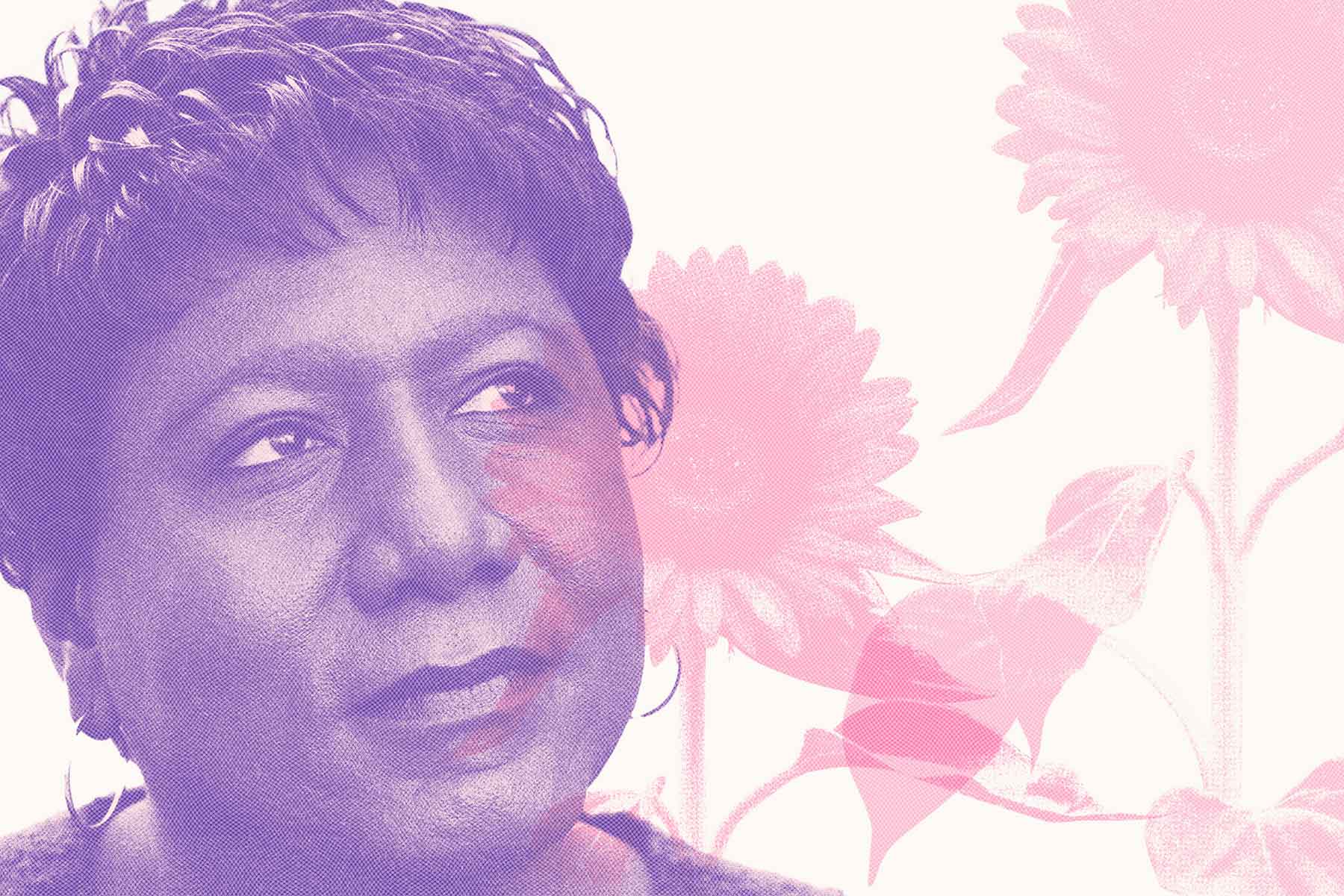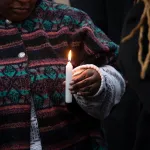This Black History Month, we’re telling the untold stories of women, women of color and LGBTQ+ people. Subscribe to our daily newsletter.
Before Monica Roberts sat down at her computer to document trans people’s lives in 2006, Black transgender women appeared in the media primarily in the form of punchlines and parodies. By the time she died in 2020, the national conversation had shifted so much that no Democratic presidential candidate could dream of running without acknowledging the crisis of anti-transgender violence.
“Accuracy in media stories about trans people matters,” Roberts said when accepting a Special Recognition Award from the media advocacy organization GLAAD in 2016. “Trans people exist. We are part of the diverse mosaic of human life, and we will not be disrespected by friend, foe, frenemy, or my governor [Greg Abbott],” she added, breaking into a laugh.
For 14 years, Roberts chronicled the greatest joys and most crushing losses of transgender people in America on her blog TransGriot. The simple blogspot site, three columns of Arial font with pixelated photos, relayed the losses of transgender murder victims and excoriated mainstream news outlets who misgendered them.
“I always say that, when we get to a point in which our news media ecosystem no longer misgenders trans people in life and/or death, we will be able to directly trace that back to Monica Roberts,” said Tre’vell Anderson, who has helped establish a scholarship in Roberts name through the National Association of Black Journalists (NABJ).
Roberts was born in 1962 in Houston. Her father worked in radio, and her mother was a teacher. It was not until after she graduated from the Houston Independent School District in 1980 that the district fully desegregated, according to the journalist Samantha Allen.
Black history reflections — and the path forward
This story is part of our Black History Month coverage. From in-depth Q&As to staff reflections and our inaugural 19th Celebrates event, we’re focused on telling stories along the twin themes of Black joy and Black resistance. Explore our work.
Roberts grew up feeling different but unable to see examples of who she could be, according to her best friend Dee Dee Watters. There were few examples of out transgender people in the media when Roberts was a child and almost no examples of Black trans people.
Roberts learned early to use media and politics to make change.
“Originally it was because she didn’t see people that looked like her when she first got her transition . . . it just grew,” Watters added. Roberts was driven to create a world where Black trans kids could see full lives for themselves, and she dreamed of watching them grow up.
In 1997, as Roberts’ activism was gaining momentum, she met another trans woman whose advocacy would irrevocably shape her own. Gwendolyn Ann Smith and Roberts met at the International Conference for Transgender Law and Employment Policy in Houston, a first-of-its-kind gathering hosted by the nation’s first out transgender judge, Phyllis Frye.
Smith and Roberts were instant friends.
“She was already just so sharp,” said Smith. “She did nothing but impress me.”
Like Roberts, Smith could not bear the way that police and media ignored the brutal killings of transgender women.
“Even here in the Bay Area, they refused to cover the deaths of trans people who were sex workers or anyone who was sex a worker, feeling that it wasn’t newsworthy enough,” said Smith.
In 1998, LGBTQ+ Americans witnessed two brutal murders. On October 12, Matthew Shepard, a White college student, died after being tortured and left tied to a fence post in Laramie, Wyoming. Weeks later on November 28, Rita Hester, a Black transgender woman, was stabbed 20 times in her Boston apartment.
While many in the nation grieved Shepard and pushed for justice, Hester’s murder was not met with the same response. Even Boston’s LGBTQ+ newspaper, Bay Windows, misgendered Hester.
Smith was done waiting for justice. In 1998, she founded the website “Remembering Our Dead,” which tallied transgender homicides each year and laid the foundation for the annual Transgender Day of Remembrance honoring trans murder victims. It was work she did alongside Roberts, who started her own blog in 2006 when financial woes shuttered Smith’s site.
“Monica also was looking at the issue of anti-transgender violence,” Smith said. “We would regularly share information back and forth.”
The two women were careful with what they reported, recognizing that not every transgender death was a murder and that reporting them as such could needlessly traumatize the community. They also learned quickly that papers misidentified victims as “bearded women” or “men in dresses.”
“One of the things Monica kept reminding me was we’re dealing with this being anti-trans violence, anti-Black violence, sometimes anti-sex worker violence,” said Smith. “You’re seeing this whole intersection of oppression.”
It was with those intersections in mind that Monica started her TransGriot blog, specifically focused on not just the deaths but the lives of Black transgender people.
“Griots in West African culture are oral historians who are able to tell up to five centuries of their people’s history from memory,” Roberts said in 2016. “One of the missions of TransGriot is to document our history: good, bad, and indifferent. And it has to be preserved for future generations to know about this.”
Roberts proudly relayed the histories of Black trans heroes like Marsha P. Johnson. Roberts herself was also making history.
“She was the first trans journalist that I had ever met, moreso the first Black trans journalist I had ever met,” said Anderson. “And her work, you know, kind of preceded her because I had discovered so much about Black trans history through her blog.”
Roberts’ mission of adding positive narratives about Black trans people was more complicated than just adding representation into mainstream culture. She fought her whole life to make space for trans people in Black media and fought to make space for Black people in queer media. In some cases, she also fought transphobia in LGBTQ+ media, on top of racism.
Roberts regularly confronted transphobia, racism, classism, homophobia and ableism, sometimes to the discomfort of others in professional spaces.
Christina Kahrl, the sports editor for the San Francisco Chronicle and a longtime friend of Roberts, laughed that people sometimes perceived Roberts as “impolite.” But Kahrl and others who knew Roberts say she had an urgent purpose.
“She was speaking from a place of knowledge, reality, conviction,” said Kahrl. “She was saying things that needed to be said.”
Derrick Clifton, a freelance writer, remembers those moments well at the Association of LGBTQ Journalists events where Roberts interrupted panel discussions to correct panelists.
“People didn’t see it as disruptive, as much as they were, like, ‘We needed that,’” Clifton said. “I can’t imagine what it must have felt like in so many cases to have been the only one in certain rooms.”
In one infamous exchange, an emcee at a 2018 Association of LGBTQ Journalists convention reception greeted the crowd with “ladies and gentlemen, things and its.” Roberts quickly replied that there were “no things and its” there.
According to Femi Redwood, a board member of the organization and co-chair of the National Association of Black Journalists’ LGBTQ task force, Roberts also had to fight for a place among Black colleagues where she stood out as a trans woman.
“You see this woman who is not concerned with what other people think. It makes you challenge your own ideals and your own thoughts on yourself and the world,” said Redwood. “When you think about the ideals of respectability politics, Black trans bodies don’t fit into that. Monica’s presence alone was challenging these preconceived notions of NABJ in general.”
Despite her profound influence, Roberts never went to work in mainstream media. She lived modestly in Houston, making a little money from her activism and writing. She lived with Watters for several years, and then on her own during the last years of her life.
Roberts talked to her mom every night before going to sleep. She also chatted with Watters. On October 5, 2020, she talked to both women. She had been having some breathing problems, but she seemed OK. On October 6, Roberts died of heart disease at the age of 58. So sudden was the loss that some media reports mistakenly identified her cause of death as a hit-and-run car accident.
Her last posts on TransGriot had nothing to do with transgender life or death. On October 1, 2020, she posted her NFL picks for the week. It was something she did regularly: post about a hobby or interest of hers.
“Monica wanted to make sure that people understood that this Black trans woman had some type of normalcy,” said Watters.
To those who knew and were inspired by her, however, Roberts was extraordinary. Black transgender legends like Janet Mock, Laverne Cox and Angelica Ross have held her up as an example and a model of what was possible for themselves. Watters can’t imagine what the world would have looked like without Roberts.
“I’m certain that it wouldn’t be the way that it is now,” she said. “I’ve heard people talk about how TransGriot has inspired them to do the things that they’ve done.”






